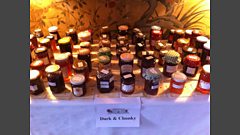Marmalade
For years figures have shown marmalade sales continually dropping, but Tim Hayward visits the quirky marmalade awards in Cumbria to see who is championing it and making the best.
Each January, with the arrival of the seville oranges, hundreds of people across the UK ritually boil and jar batches of marmalade, following family recipes and leaving their kitchens sticky and fragrant with citrus. But who's eating it? For years sales figures have been in decline and the under 25s say it's 'boring'.
So Tim Hayward heads out to a little corner of Cumbria to the Dalemain estate where the amber preserve is celebrated at the Marmalade Championships. From 'dark and chunky' to 'any citrus' hundreds of home-made and artisan examples have been entered for judging while enthusiasts dressed in orange accessories browse the presentations.
He asks whether marmalade, once commonplace on British breakfast tables, is dying a slow death or becoming the preserve of the wealthy or an enthusiastic elite. He also learns a worrying truth - could foreign marmalade makers now be beating us at making the best?
Produced in Bristol by Anne-Marie Bullock.
Last on
More episodes
Previous
Next
Blanka Milfaitová's recipe for her award-winning lemon marmalade

To start, put one kilogram of lemons into a pan and boil them for around 2 hours, or until the peel has softened. You will then need to remove the pips. Cut all the fruits together with pulp to very thin slices. Then add one kilogram of sugar mixed with pure citrus pectin, and stir until all the sugar is dissolved. Boil rapidly for 20 minutes until marmalade sets when tested. Finally put the marmalade into the jars, and to each jar add a little bit of enthusiasm and passion!
Broadcasts
- Sun 24 Mar 2013 12:32Â鶹ԼÅÄ Radio 4
- Mon 25 Mar 2013 15:30Â鶹ԼÅÄ Radio 4
Featured in...
![]()
Great British Foods
The Food Programme takes a lip-smacking look back at some of the foods that make Britain.
Download this programme
Subscribe to this programme or download individual episodes.
Can comfort foods really make you feel better?
Yes they can, says Sheila Dillon.
Podcast
-
![]()
The Food Programme
Investigating every aspect of the food we eat




